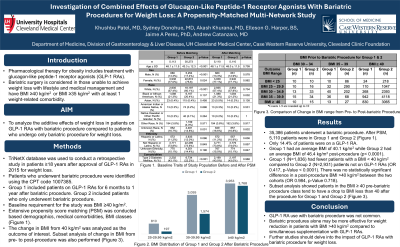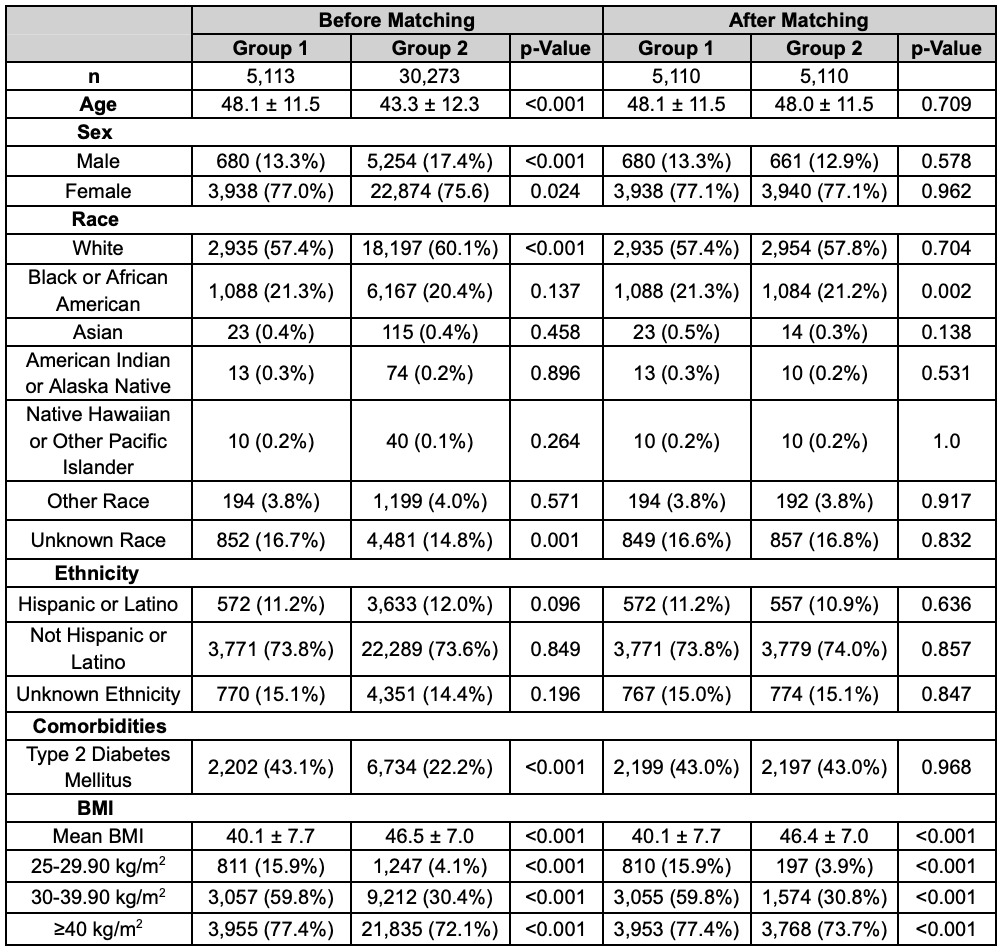Tuesday Poster Session
Category: Obesity
P4871 - Investigation of Combined Effects of Glucagon-Like Peptide-1 Receptor Agonists With Bariatric Procedures for Weight Loss: A Propensity-Matched Multi-Network Study
Tuesday, October 29, 2024
10:30 AM - 4:00 PM ET
Location: Exhibit Hall E

Has Audio
.jpg)
Khushbu Patel, MD
University Hospitals Cleveland Medical Center, Case Western Reserve University
Cleveland, OH
Presenting Author(s)
Khushbu Patel, MD1, Sydney Donohue, MD1, Akash Khurana, MD2, Elleson G. Harper, BS1, Jaime A. Perez, PhD3, Andrew Catanzaro, MD4
1University Hospitals Cleveland Medical Center, Case Western Reserve University, Cleveland, OH; 2Cleveland Clinic, Cleveland, OH; 3University Hospitals Clinical Research Center, Cleveland, OH; 4Digestive Health Institute, University Hospitals Cleveland Medical Center, Cleveland, OH
Introduction: Glucagon-like peptide-1 receptor agonists (GLP-1 RAs) are being widely utilized for weight reduction. Bariatric procedures are alternatively used for the treatment of obesity. This study aims to analyze the additive effects of GLP-1 RAs with bariatric procedures compared to patients who undergo only bariatric procedures for weight loss.
Methods: A retrospective study was performed using TriNetX, a de-identified database with data from 89 healthcare organizations. We identified all patients ≥18 years, after the FDA approval of GLP-1 RAs for weight loss in 2015, who underwent a bariatric procedure using the CPT code 1007385. The patients were stratified into two groups based on concomitant use of GLP-1 RAs for 6 months to 1 year post-procedure (i.e. Dulaglutide, Semaglutide, Tirzepatide, and Liraglutide). For the two groups, propensity score matching was performed based on demographics, comorbidities, and body mass index (BMI) classes (BMI 25-29.90 kg/m2, 30-39.90 kg/m2, and >40 kg/m2). To qualify for a bariatric procedure, one of the requirements entails having a BMI >40 kg/m2, which is the baseline requirement for our study. We then analyzed the change in BMI from 40 kg/m2 as the outcome of interest. Baseline differences were calculated using independent t-tests and chi-square tests. Odds ratios (OR) and 95% confidence intervals (Cl) were calculated to describe the risks.
Results: A total of 35,386 patients who underwent a bariatric procedure were identified. 5,113 were on a GLP-1 RA after the procedure (Group 1) compared to 30,273 patients who were not (Group 2). After propensity score matching, 5,110 patients were in each cohort. Only 16.9% of people were on a GLP-1 RA after a bariatric procedure. Group 1 had an average BMI of 40.1 kg/m2 while Group 2 had an average BMI of 46.4 kg/m2 post-procedure (p< 0.0001) (Figure 1). Fewer patients in Group 1 on GLP-1 RAs had a BMI < 40 kg/m2compared to Group 2 patients not on GLP-1 RAs (OR 0.417, p-Value < 0.0001). However, there was no statistically significant difference in a post-procedure BMI >40 kg/m2 between the two cohorts (Figure 2).
Discussion: Based on this data, GLP-1 RA use is not common in patients who undergo a bariatric procedure. Bariatric procedures alone may be more effective for weight loss reduction in patients with BMI >40 kg/m2 compared to simultaneous supplementation with GLP-1 RAs. Further studies should delve into the impact of GLP-1 RA on weight loss and the optimal duration of use after a bariatric procedure.

Note: The table for this abstract can be viewed in the ePoster Gallery section of the ACG 2024 ePoster Site or in The American Journal of Gastroenterology's abstract supplement issue, both of which will be available starting October 27, 2024.
Disclosures:
Khushbu Patel, MD1, Sydney Donohue, MD1, Akash Khurana, MD2, Elleson G. Harper, BS1, Jaime A. Perez, PhD3, Andrew Catanzaro, MD4. P4871 - Investigation of Combined Effects of Glucagon-Like Peptide-1 Receptor Agonists With Bariatric Procedures for Weight Loss: A Propensity-Matched Multi-Network Study, ACG 2024 Annual Scientific Meeting Abstracts. Philadelphia, PA: American College of Gastroenterology.
1University Hospitals Cleveland Medical Center, Case Western Reserve University, Cleveland, OH; 2Cleveland Clinic, Cleveland, OH; 3University Hospitals Clinical Research Center, Cleveland, OH; 4Digestive Health Institute, University Hospitals Cleveland Medical Center, Cleveland, OH
Introduction: Glucagon-like peptide-1 receptor agonists (GLP-1 RAs) are being widely utilized for weight reduction. Bariatric procedures are alternatively used for the treatment of obesity. This study aims to analyze the additive effects of GLP-1 RAs with bariatric procedures compared to patients who undergo only bariatric procedures for weight loss.
Methods: A retrospective study was performed using TriNetX, a de-identified database with data from 89 healthcare organizations. We identified all patients ≥18 years, after the FDA approval of GLP-1 RAs for weight loss in 2015, who underwent a bariatric procedure using the CPT code 1007385. The patients were stratified into two groups based on concomitant use of GLP-1 RAs for 6 months to 1 year post-procedure (i.e. Dulaglutide, Semaglutide, Tirzepatide, and Liraglutide). For the two groups, propensity score matching was performed based on demographics, comorbidities, and body mass index (BMI) classes (BMI 25-29.90 kg/m2, 30-39.90 kg/m2, and >40 kg/m2). To qualify for a bariatric procedure, one of the requirements entails having a BMI >40 kg/m2, which is the baseline requirement for our study. We then analyzed the change in BMI from 40 kg/m2 as the outcome of interest. Baseline differences were calculated using independent t-tests and chi-square tests. Odds ratios (OR) and 95% confidence intervals (Cl) were calculated to describe the risks.
Results: A total of 35,386 patients who underwent a bariatric procedure were identified. 5,113 were on a GLP-1 RA after the procedure (Group 1) compared to 30,273 patients who were not (Group 2). After propensity score matching, 5,110 patients were in each cohort. Only 16.9% of people were on a GLP-1 RA after a bariatric procedure. Group 1 had an average BMI of 40.1 kg/m2 while Group 2 had an average BMI of 46.4 kg/m2 post-procedure (p< 0.0001) (Figure 1). Fewer patients in Group 1 on GLP-1 RAs had a BMI < 40 kg/m2compared to Group 2 patients not on GLP-1 RAs (OR 0.417, p-Value < 0.0001). However, there was no statistically significant difference in a post-procedure BMI >40 kg/m2 between the two cohorts (Figure 2).
Discussion: Based on this data, GLP-1 RA use is not common in patients who undergo a bariatric procedure. Bariatric procedures alone may be more effective for weight loss reduction in patients with BMI >40 kg/m2 compared to simultaneous supplementation with GLP-1 RAs. Further studies should delve into the impact of GLP-1 RA on weight loss and the optimal duration of use after a bariatric procedure.

Figure: Figure 1. Baseline Traits of Study Population Before and After Propensity Score Matching
Note: The table for this abstract can be viewed in the ePoster Gallery section of the ACG 2024 ePoster Site or in The American Journal of Gastroenterology's abstract supplement issue, both of which will be available starting October 27, 2024.
Disclosures:
Khushbu Patel indicated no relevant financial relationships.
Sydney Donohue indicated no relevant financial relationships.
Akash Khurana indicated no relevant financial relationships.
Elleson Harper indicated no relevant financial relationships.
Jaime Perez indicated no relevant financial relationships.
Andrew Catanzaro indicated no relevant financial relationships.
Khushbu Patel, MD1, Sydney Donohue, MD1, Akash Khurana, MD2, Elleson G. Harper, BS1, Jaime A. Perez, PhD3, Andrew Catanzaro, MD4. P4871 - Investigation of Combined Effects of Glucagon-Like Peptide-1 Receptor Agonists With Bariatric Procedures for Weight Loss: A Propensity-Matched Multi-Network Study, ACG 2024 Annual Scientific Meeting Abstracts. Philadelphia, PA: American College of Gastroenterology.
